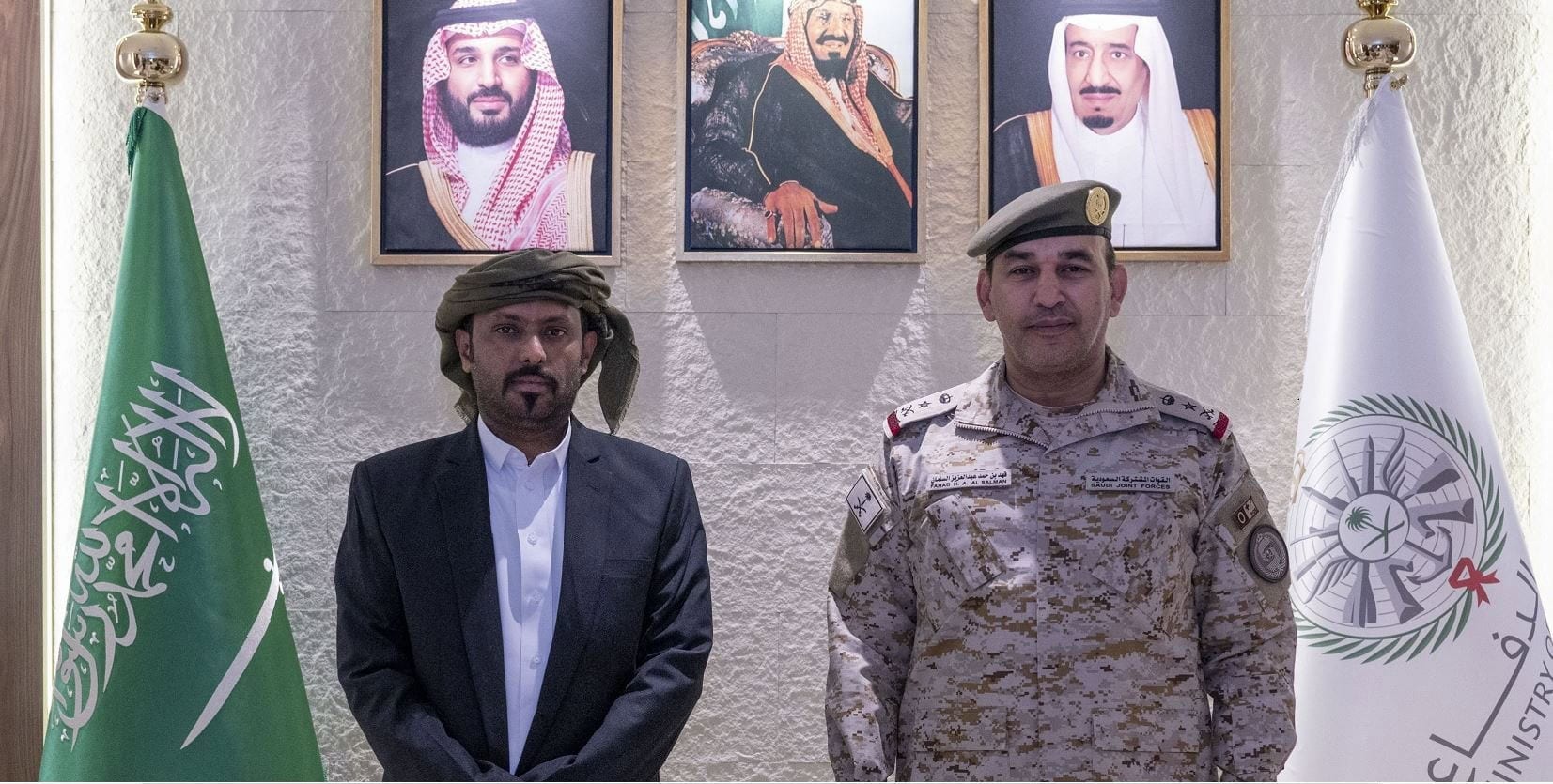
The photo is from the meeting between Joint Forces Commander Fahd Al-Salman and Sheikh of Hadramout Amr bin Habrish in Riyadh on March 26, 2025 (Saudi Ministry of Defense).
28-03-2025 الساعة 8 مساءً بتوقيت عدن
|
|
Mukalla (South24 Center)
Saudi Arabia has taken an unprecedented public step into the political fray in Yemen’s Hadramout governorate, following internal divisions among the oil-rich region’s tribal leadership and rising tensions over local security arrangements.
On Sunday (March 24), tribal leaders from the Hadramout Tribal Alliance voted to remove their chief, Sheikh Amr bin Habrish, during a meeting in the Al-Oyoun area. The group accused bin Habrish of making unilateral decisions on matters of critical importance relating to the governorate. A preparatory committee was formed to organize a general conference aimed at selecting new leadership and reviving the so-called ’Presidential Matrix'—a package of decisions previously approved by Yemen’s Presidential Leadership Council (PLC) regarding Hadramout but never implemented. The tribal leaders also reaffirmed support for the Southern Transitional Council (STC)-backed Hadrami Elite Forces and the local security apparatus.
The developments came in the aftermath of the March 15 visit to Hadramout by STC President Aidrous Al-Zubaidi, during which he warned against efforts to undermine the local stability by establishing parallel military formations to the Hadrami Elite Forces. Shortly after the visit, Saudi Arabia dispatched a private aircraft to transport bin Habrish—who also serves as deputy governor of Hadramout and heads the Inclusive Hadramout Conference—to Riyadh.
In the Saudi capital, bin Habrish held separate meetings with Saudi Defense Minister Prince Khalid bin Salman and Joint Forces Commander Lt. Gen. Fahd Al-Salman. While details of the discussions are not available, the meetings signal heightened Saudi engagement in Hadramout’s internal affairs. According to bin Habrish, the talks with Gen. Al-Salman covered “the general situation on the ground and the importance of strengthening security in Hadramout as part of broader efforts to stabilize Yemen.”
This marks the first known instance of Riyadh publicly meeting with a tribal figure outside Yemen’s formal political leadership, reflecting what observers see as a personal interest from Prince Khalid, who heads the Yemen portfolio within the Saudi government.
Saudi Arabia’s growing involvement also comes through its informal ’Special Committee’ on Yemen, a powerful body with direct links to the kingdom’s leadership. The committee is known for using financial aid as leverage and personal networks to influence tribal and local actors across Yemen, including in Hadramout.
The latest move follows previous Saudi-backed efforts—supported by Presidential Leadership Council (PLC) head Rashad Al-Alimi—to establish a ’Hadramout National Council‘ as a counterbalance to the increasingly influential Southern Transitional Council (STC). However, the Saudi initiative failed to gain significant traction. Riyadh has also supported the formation of Salafi-leaning paramilitary units under the ’Shield of the Nation‘ banner, which have been deployed in parts of eastern southern Yemen and along border regions.
Despite repeated invitations by the Southern Transitional Council (STC) for dialogue, the Inclusive Hadramout Conference leadership declined to meet with Al-Zubaidi during his March 15 visit, sources told ‘South24 Center’.
Bin Habrish had on February 26 announced the creation of an armed militia dubbed the ’Hadramout Protection Forces’. An unofficial meeting between bin Habrish and the military figures of the new militia drew a backlash from local authorities and the command of the Second Military District in coastal Hadramout.
On February 27, the Second Military District had said in a statement that any military meeting outside the official scope “threatens the unity of the Hadrami Elite Forces” and termed the formation of the new militia as “unlawful”.